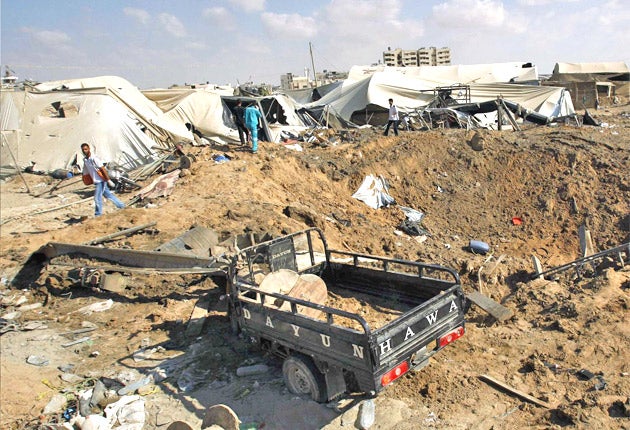Gaza militants launch rocket attacks in effort to derail peace talks

Your support helps us to tell the story
From reproductive rights to climate change to Big Tech, The Independent is on the ground when the story is developing. Whether it's investigating the financials of Elon Musk's pro-Trump PAC or producing our latest documentary, 'The A Word', which shines a light on the American women fighting for reproductive rights, we know how important it is to parse out the facts from the messaging.
At such a critical moment in US history, we need reporters on the ground. Your donation allows us to keep sending journalists to speak to both sides of the story.
The Independent is trusted by Americans across the entire political spectrum. And unlike many other quality news outlets, we choose not to lock Americans out of our reporting and analysis with paywalls. We believe quality journalism should be available to everyone, paid for by those who can afford it.
Your support makes all the difference.Short-range rockets and mortars rained on southern Israel yesterday as militants sought to derail the revived peace process on the second day of talks between Israeli and Palestinian leaders.
Militants in Gaza, the coastal enclave controlled by Hamas, fired at least nine projectiles into Israel, causing no injuries. Israel responded with an air strike on Gaza, killing a 23-year-old Palestinian man.
The upsurge in attacks came during talks in Jerusalem, where Washington is pushing for a breakthrough in the peace process, launched a fortnight ago after nearly two years of stalled negotiations.
At the end of the second day, George Mitchell, the US envoy, sounded a cautious note of optimism, hinting that the two sides were making progress over the extension of a construction freeze in the Jewish settlements in the occupied West Bank.
"We continue in our efforts to make progress in that regard and believe we are doing so," Mr Mitchell told reporters after Israeli Prime Minister Benjamin Netanyahu and Palestinian President Mahmoud Abbas met in Jerusalem.
"The two leaders are not leaving the tough issues to the end of their discussions," he added. "We take this as a strong indicator of their belief that peace is possible."
Ahead of a packed day of meetings, Hillary Clinton, the US Secretary of State, had reiterated her confidence about reaching an agreement, saying: "This is the time, and these are the leaders." The US, she promised, would be "an active and sustained partner throughout the process". But even as she urged the two sides to grab the "moment of opportunity", yesterday's attacks served as a reminder of the difficulties facing the leaders as they discuss divisive core issues amid an atmosphere of either domestic opposition or apathy.
Mr Abbas's political mandate to lead expired months ago, while he is keen to avoid a takeover by Hamas, which is growing in popularity, in the West Bank.
Hamas, which has no role in the peace negotiations, has passionately rejected the return to direct talks. It has accused Mr Abbas's Fatah movement of betraying the Palestinian cause amid a widely held belief among Palestinians that the hawkish Israeli Premier will never allow the Palestinians a viable state of their own.
Hamas claimed responsibility for a deadly attack on Israeli settlers two weeks ago, aimed at disrupting the peace process on the eve of the launch of negotiations in Washington. It has desisted from mounting attacks from Gaza, however, after it imposed a de facto ceasefire following Israel's military offensive on the enclave in 2008. The Popular Resistance Committee, a small group opposed to the talks, claimed responsibility for yesterday's attacks, which included mortars armed with white phosphorous, which causes severe burns.
The attacks failed to throw the negotiators off balance. The US still hopes to achieve a framework deal within a year, but before the negotiations can progress, the two sides must first reach an agreement on the construction freeze amid Palestinian threats to quit the talks if the moratorium is not prolonged.
In a scathing editorial in Israeli newspaper Ha'aretz, Amira Hass accused Israel of double standards, noting that "in the 62 per cent of the West Bank under full Israeli control... Israel has frozen Palestinian construction for the past four decades."
Mr Netanyahu, who faces a revolt from his pro-settler governing coalition if he makes concessions on the freeze, has ruled out an extension, hinting instead at a curb on construction.
The moratorium is due to expire at the end of September, and many settlers have vowed to start work on thousands of houses as soon as the deadline ends.
Join our commenting forum
Join thought-provoking conversations, follow other Independent readers and see their replies
Comments